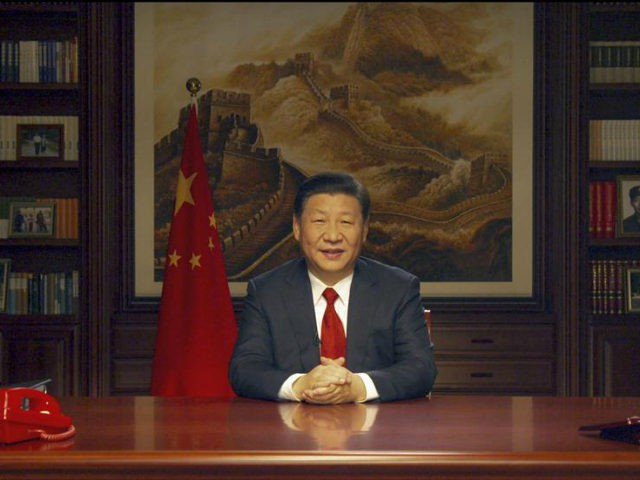Chinese communist leader Xi Jinping assured listeners in his New Year’s Eve speech that “China has something to say” on international issues in 2018, promising that under his regime, Beijing will be a “keeper of international order.”
In a speech Chinese state media hailed as “encouraging” and “inspiring,” Xi promised to eradicate all poverty from China by 2020 and touted the nation’s “One Belt One Road” (OBOR) intercontinental infrastructure plan.
His assurances that China will be a powerful player on the international stage follow renewed criticism of China’s ties to North Korea after President Donald Trump accused Beijing of selling oil to the rogue regime illegally. Trump’s administration recently branded China a “strategic competitor” and accused China of economic dishonesty, regional belligerence, and contributing to the U.S. opioid epidemic.
“Reform and opening-up is the path we must take to make progress in contemporary China and to realize the Chinese dream,” Xi asserted in his speech Sunday. “Only three years are left to 2020. Every one of us must be called to action, do our best, take targeted measures to secure victories one after another,” he said, promising an end to poverty by 2020.
On international issues, Xi said China was “a responsible major country,” and, as such, “China has something to say.”
He said:
China will resolutely uphold the authority and status of the United Nations, actively fulfill China’s international obligations and duties, remain firmly committed to China’s pledges to tackle climate change, actively push for the Belt and Road Initiative, and always be a builder of world peace, contributor of global development and keeper of international order.
Xi’s assertion that China is a “major country” echoes remarks he made during the nation’s Communist Party Congress in October. At that event, Xi stated that the goal of the Communist Party into the next decade and beyond would be to cement its status as the world’s largest power. “It is time for us to take center stage in the world and to make a greater contribution to humankind,” he stated then.
Xinhua, a Chinese state outlet, notes that Belt and Road played a significant role in Xi’s speech. The OBOR path consists of two parts: the Silk Road Economic Belt, a proposed land transportation route from Beijing to western Europe through the Middle East and parts of Africa; and the Maritime Silk Road – essentially most of the South China Sea.
On land, the OBOR projects initially bring local jobs to the regions where China wants to lay its tracks. Once those projects are completed, however, they give China power over pivotal trade and transportation routes, and China has indicated it has interest in imposing Chinese law on the tracks it lays outside of its borders.
In the sea, China claims territory within the Exclusive Economic Zones (EEZs) of Vietnam, the Philippines, Malaysia, Brunei, and Taiwan and has constructed illegal military facilities in some of that territory. Among the acts China has taken in this decade contrary to Xi’s vow to “uphold the authority and status of the United Nations” is to disregard an international tribunal ruling against these constructions. In 2016, the Permanent Court of Arbitration at the Hague ruled China’s presence in those regions to be illegal; China has continued building artificial islands and weaponizing them.
Last week, President Trump accused Chinese officials of violating United Nations sanctions on North Korea, in addition to breaking international law in the South China Sea: “Caught RED HANDED – very disappointed that China is allowing oil to go into North Korea. There will never be a friendly solution to the North Korea problem if this continues to happen!” Trump tweeted. South Korean law enforcement revealed on Friday that they had seized a Hong Kong ship reportedly transporting oil illegally to North Korea.
North Korea has poured the little profits it makes in international trade – overwhelmingly trade with China – into a nuclear weapons program targeting the United States. In his own New Year’s Eve speech, dictator Kim Jong-un said he has a nuclear button on his desk and can now reach the United States with his weapons, a claim international experts have not been able to verify.
The South China Sea situation and North Korean crisis were among the reasons Trump’s National Security Strategy labeled China a “strategic competitor.” The document also accused the Chinese government of large-scale international property theft against the United States, predatory lending practices against developing countries in projects like OBOR, and distribution of deadly opioids.
Chinese communist state media nonetheless praised Xi for an “inspiring and practical” message. “It embodies the President’s work style, which combines broad strategic vision with meticulous attention to detail,” one “expert,” Keith Bennett of the 48 Group Club, told Xinhua. “This reflects the fact that meeting the people’s needs and expectations needs more than empty slogans.”

COMMENTS
Please let us know if you're having issues with commenting.